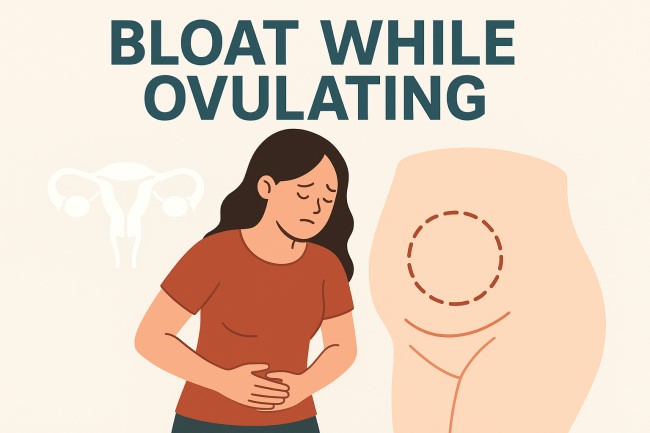Bloat While Ovulating: Causes, Symptoms, and Effective Remedies

Many women experience noticeable changes in their bodies during the menstrual cycle, and one of the most common yet often overlooked symptoms is bloat while ovulating. This temporary abdominal swelling can be uncomfortable, sometimes even mistaken for weight gain or digestive problems. Understanding why bloating occurs during ovulation, its connection to hormonal changes, and ways to manage it can help women feel more in control of their bodies.
Understanding Bloating During Ovulation
What Is Ovulation Bloating?
Bloating while ovulating refers to the sensation of fullness, tightness, or swelling in the abdomen that occurs around the middle of the menstrual cycle. This is when the ovary releases an egg, typically between days 12 and 16 in a 28-day cycle. While many women expect bloating before their periods, not everyone realizes it can happen during ovulation as well.
How Common Is It?
If you’ve ever asked yourself, “Do you bloat while ovulating?”, the answer is yes — many women do. The intensity varies from person to person; for some, it’s barely noticeable, while for others, it can cause significant discomfort and affect daily activities.
Why Does Bloat Happen While Ovulating?
Hormonal Fluctuations
During ovulation, the body experiences a surge in estrogen followed by an increase in progesterone. These hormonal shifts can:
-
Cause water retention, leading to puffiness and swelling.
-
Slow down digestion, which may make the stomach feel fuller.
-
Relax the smooth muscles of the digestive tract, sometimes resulting in mild constipation.
Follicle Growth and Egg Release
Before ovulation, the ovarian follicle swells as it prepares to release the egg. This natural process can cause pressure and a sense of heaviness in the lower abdomen. In some cases, a small amount of fluid is released along with the egg, irritating the surrounding tissues and contributing to bloating.
Increased Blood Flow
Ovulation increases blood flow to the pelvic area. While this supports fertility, it can also cause tissues to feel slightly swollen or tender.
Signs and Symptoms of Bloating While Ovulating
Physical Symptoms
-
Noticeable swelling in the lower abdomen
-
A feeling of heaviness or fullness
-
Mild cramping or discomfort
-
Increased sensitivity in the abdominal area
Related Ovulation Symptoms
Bloating often appears alongside other ovulation signs such as:
-
Mid-cycle cramping (mittelschmerz)
-
Changes in cervical mucus
-
Heightened sense of smell or taste
-
Increased libido
How Long Does Ovulation Bloating Last?
Bloating related to ovulation usually lasts a few hours to a couple of days. In most cases, it subsides once hormone levels stabilize after the egg is released. However, for some women, it can last longer, especially if digestive changes are more pronounced during this time.
When to Seek Medical Advice
While bloat while ovulating is typically harmless, certain situations require medical attention:
-
Severe or persistent bloating lasting more than a week
-
Accompanying symptoms like fever, severe pain, or abnormal bleeding
-
Sudden bloating unrelated to the menstrual cycle
These signs could indicate underlying conditions such as polycystic ovary syndrome (PCOS), endometriosis, or ovarian cysts.
Tips to Reduce Bloating While Ovulating
Dietary Adjustments
-
Stay Hydrated – Drinking enough water helps flush excess sodium and reduces fluid retention.
-
Limit Salty Foods – High sodium intake worsens water retention.
-
Choose Potassium-Rich Foods – Bananas, avocados, and sweet potatoes help balance electrolytes.
-
Eat Smaller Meals – Large meals can make abdominal discomfort worse.
Lifestyle Habits
-
Light Exercise – Activities like walking or yoga can improve circulation and digestion.
-
Stress Management – Stress hormones can aggravate bloating; try deep breathing or meditation.
-
Avoid Carbonated Drinks – They can increase gas and bloating sensations.
Natural Remedies
-
Warm Compress – Applying heat to the abdomen can relax muscles and ease discomfort.
-
Gentle Abdominal Massage – Helps stimulate digestion and reduce water retention.
-
Herbal Teas – Peppermint or ginger tea can soothe digestive irritation.
Preventing Severe Ovulation Bloating
While you can’t completely avoid hormonal changes, you can reduce the impact of bloating by:
-
Maintaining a balanced diet throughout the month
-
Tracking your cycle to anticipate ovulation-related symptoms
-
Avoiding processed foods and excessive sugar
-
Staying physically active to promote circulation and digestion
Myths About Ovulation Bloating
Myth 1: It’s the Same as PMS Bloating
PMS bloating happens before menstruation and is often more intense due to higher progesterone levels. Bloat while ovulating occurs mid-cycle and is shorter in duration.
Myth 2: It’s Always Caused by Food
While certain foods can contribute to bloating, ovulation bloating is primarily hormonal. Diet plays a role in how severe it feels but is not the root cause.
Myth 3: It Means Something Is Wrong
For most women, bloating during ovulation is a natural, harmless symptom and not a sign of a serious health problem.
The Connection Between Fertility and Bloating
Some experts believe that ovulation-related bloating might be linked to the body’s preparation for possible pregnancy. Hormonal changes increase nutrient absorption and blood flow to the reproductive organs, but they also cause temporary digestive slowdowns and water retention.
Key Takeaways
-
Bloat while ovulating is a common mid-cycle symptom caused by hormonal changes, follicle growth, and fluid retention.
-
It’s usually temporary, lasting from a few hours to a couple of days.
-
Symptoms can often be managed with hydration, a balanced diet, light exercise, and stress control.
-
Persistent or severe bloating should be evaluated by a healthcare provider to rule out underlying conditions.
Conclusion
While bloating while ovulating can be an uncomfortable part of the menstrual cycle, understanding why it happens can make it easier to manage. By recognizing the signs, making simple lifestyle adjustments, and knowing when to seek medical advice, women can reduce discomfort and feel more confident about their reproductive health. So, the next time you wonder, “Do you bloat while ovulating?”, you’ll know that it’s a natural, often harmless process — and there are plenty of ways to keep it under control.



